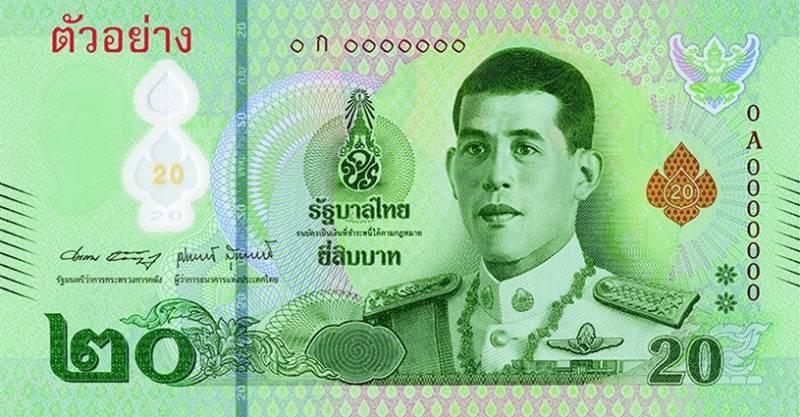The Bank of Thailand plans to start issuing 20-baht polymer banknotes on March 24.

The Bank of Thailand will start issuing 20 Baht Polymer Banknote on 24 March 2022. Seen in the picture is an example of a 20 Baht Polymer Banknote.
The initiative to change from paper to polymer aims to improve the quality because the polymer material is cleaner and more durable.
As the 20-baht note is the most widely used denomination, it is more prone to becoming worn out and soiled than other denominations, the central bank said.
The advantage of polymer over paper is it does not absorb moisture and dirt. This allows polymer banknotes to last significantly longer than paper banknotes. The durability of polymer banknotes will reduce the need to print new notes to replace damaged ones over the long term, which is better for the environment, said the central bank.
The transition to polymer banknotes is also in line with the Bank of Thailand's sustainability policy.
The 20-baht polymer banknote has the same design and features as the paper version.
Advanced anti-counterfeit technologies are being used to ensure fake polymer banknotes would be difficult to produce, said the central bank.
An additional security feature is a clear window that can be seen through from both sides. The lower clear window shifts colour from translucent yellow to red. For the visually impaired, another added feature is a small "20" in embossed numbers in the upper clear window that can be easily felt.
The new banknotes are slated for issue on March 24 through the branches of all banks. Paper 20-baht banknotes remain legal tender. Twenty-baht banknotes account for more than 30% of banknotes in circulation, the highest proportion.
Given their popularity, 20-baht banknotes are used longer than other banknotes, said Pairote Balun, the central bank's director for banknote strategy and corporate affairs.
The central bank prints about 1.8 billion banknotes each year, of which 600 million are 20-baht banknotes. As of 2021, 20-baht banknotes in circulation amounted to 47 billion baht.
The life cycle of the new polymer banknote is expected to be five years, compared with 2-3 years for the paper version.
The central bank has informed companies that use vending machines to adjust technology to handle the new polymer banknote, he said. Mr Pairote said the central bank expects 60-70% of these machines to be able to accept the new polymer banknote from March 24, gradually increasing to 90%.
"Despite progress in digital payments, some people still prefer to use banknotes so we have to ensure their quality, security and cleanliness," he said.







